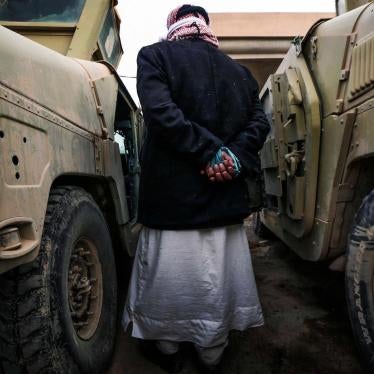(New York) - The US government should not forcibly return detainees to places where they fear ill-treatment without providing them a fair legal process to contest their repatriation, Human Rights Watch said today. The Obama administration on January 6, 2011, transferred detainee Saeed Farhi bin Mohammed to his native Algeria despite his expressed fears of abuse in his homeland - the second forcible US return to that country in six months.
"A detainee who claims he faces danger upon his return should first be able to present those claims before a neutral arbiter," said Andrea Prasow, senior counterterrorism counsel at Human Rights Watch. "The US should not compound the unlawful detentions at Guantanamo by sending people back to places where they may be mistreated."
Mohammed, 49, has been detained for more than eight years in Guantanamo. A court ordered his release after he challenged his detention in federal court. Although he sought release from custody, he told his lawyers he did not want to return to Algeria under any circumstances because he feared persecution from the Algerian government and Islamist militants. Mohammed worked as an itinerant laborer in Britain, France, and Italy in the 1990s and moved to Afghanistan months before the 9/11 attacks. After the US invasion of Afghanistan, he fled to Pakistan where he was taken into custody and transferred to Guantanamo in 2002.
Rather than carry out forced returns, the Obama administration has resettled most Guantanamo detainees who fear persecution at home in safe third countries. However, in July 2010, the US transferred Algerian Aziz Abdul Naji to Algeria against his objections and without providing him an independent opportunity to contest his transfer. Mohammed's is the second forcible transfer to Algeria.
A US federal judge ruled in November 2009 that Mohammed was being unlawfully held at Guantanamo and ordered his release. He was subsequently granted an emergency stay on his repatriation, but the lower court ruling was overturned at the appellate level and the US Supreme Court refused to stay his transfer pending appeal. Although his appeal is still pending before the Supreme Court, he was nevertheless transferred before the government even filed its opposition papers.
US officials say that Algeria's human rights record has improved significantly over the past decade and in court filings in other Algerian cases, the US has asserted that the Algerian government has provided so-called "diplomatic assurances" - promises to treat returned detainees humanely. Human Rights Watch's research has shown that diplomatic assurances provided by receiving countries, which are legally unenforceable, do not provide an effective safeguard against torture and ill-treatment. Algerian human rights groups report that torture and other cruel, inhuman, or degrading treatment are at times used on those suspected of terror links.
"An independent arbiter and not a self-interested US government should make the call as to whether or not Algeria is safe for Mohamed," Prasow said. "Diplomatic assurances of another country are not reliable and provide no real protection."
During the George W. Bush presidency, Human Rights Watch documented that detainees who were returned to Russia and Tunisia suffered abuse despite diplomatic assurances from the receiving countries that they would treat the detainees humanely.
According to the Convention against Torture, which the US ratified in 1994, no one can be sent to a country where there are substantial grounds for believing that the person would be in danger of being subjected to torture or other ill-treatment. The Committee against Torture, the international expert body that monitors compliance with the Convention against Torture, said in 2006 that the United States "should always ensure that suspects have the possibility to challenge decisions of refoulement [return]."
The US government has previously resettled detainees who feared repatriation to safe third countries. These include detainees from China, Egypt, Libya, the Occupied Palestinian territories, Syria, and Tunisia.
Some 26 Algerians were originally held at Guantanamo. Prior to Mohammed's forcible repatriation, 10 Algerians had voluntarily returned to Algeria. Most of these were held incommunicado for 12 days by the Algerian Department of Intelligence and Security (DRS), as permitted under Algerian law. None of the men reported that they were physically abused while in custody.
The Algerian government subsequently charged several of the returned men with being members of a foreign terrorist organization and tried them in criminal court. All were acquitted. One detainee, Ahmed Belbacha, who remains at Guantanamo, was tried in absentia in November 2009 and sentenced to 20 years in prison. Under Algerian law, Belbacha has the right to a new trial upon his return to Algeria. In addition to Belbacha, six other Algerians remain at Guantanamo, many of whom also fear being sent back to Algeria.
Although the Algerian detainees who were returned voluntarily to Algeria have not reported serious abuse, this should not be the basis for determining how future returnees will be treated. Some of the men who returned voluntarily were elderly, in ill health, or had wound up at Guantanamo as cases of mistaken identity. Some of the remaining detainees, though never accused of any crime, might be perceived by the Algerian government as more dangerous than those who previously returned.
"The US should provide medical and other assistance to those returned to Algeria so that they can reintegrate into society and repair their lives," said Prasow.






